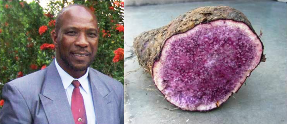UWI Mona discovers anti cancer properties in yams
Research conducted by Dr. Dennis Bailey, for his Doctorate Degree, has revealed the presence of anti-cancer properties in indigenous varieties of yams cultivated in Jamaica, namely the Dioscorea alata cultivar more popularly known as St. Vincent Dark night and Moonshine Yams.
Bailey confirmed the anti cancer potency of the yams by conducting research at the cellular level, inside the body of rats and in test tubes, using cancer cell lines in the breast, colon and skin. He found that their cancer reduced in size dramatically in comparison to the control group of rats.
According to Bailey, “purple yams contain potent phytochemicals which slow down the growth of cancer cells. Assessment of these tubers has revealed several anthocyanins and high antioxidant properties which prevent the proliferation of cancer cells.” Bailey noted that about 90 per cent of the rats used as control died within 10 days of the experiment as their cancer kept spreading, while those fed with the anti-cancer yam extract lived. Their cancer sizes were greatly reduced or stopped growing during the study period. He also used the same extracts on normal cell lines and found that it did not affect the normal cells but destroyed the cancer cells. He added: “The extract effect on the cell was concentration dependent. We were able to find a specific dose that was very effective against the cancer cells.”
Bailey also foresees tremendous potential in purple yam production. His ultimate desire is to see purple yams becoming staple crops which would aid in the reduction of cancers, diabetes and arthritis. “We would like purple yams to be exported so that Jamaica could earn more foreign exchange. The export potential and the pharmaceutical impact are great” Bailey said.
Bailey commenced his research on purple yams in 2002, leading to the award of the doctoral degree in 2013, following transfer of his MPhil registration to PhD registration in 2007. He was supervised by Professor Helen Asemota, the current Director of the Biotechnology Centre, The Yam anti-cancer extract is currently being considered for the award of a US patent.
UWI Mona’s extensive Yam Research pedigree
Research on yams began at the Biotechnology Centre in 1991 in an attempt to find solutions to the local yam production problems. The current Director of the Centre, Prof. Helen Asemota, started the Yam Group in 1993. She heads the current group of 15 yam researchers and has, to date, supervised 28 Ph. D and two M. Phil theses on yam research. Based on studies of 25 Jamaican yam varieties, the group has looked at yam as a food, medicine and as industrial raw materials. The research has also fostered capacity building in Research and Development in the country. “We have trained many yam experts and they are dispersed in various sectors of society for research and development’. Dr. Andrew Wheatley is one of these experts who in 1995 devised a micro propagation system suitable for the sustainable production of yams, in his PhD studies. The findings were patented locally.
Dr. Dwayne Stennet also completed his doctorate on the role of yams in lowering cholesterol in the blood, from which a USA provisional patent was received. Dr. Cliff Riley characterized all of the starches from the 25 varieties yams for his Ph. D. study. From the results of Riley's work, Dr. Alexia Harvey worked on the chemical modification of some of the starches to produce a starch of superior excipient quality to cornstarch. This recent study – The Chemical Modification of Yam Starches and their Potential Use in Pharmaceutical Formulations - won for Harvey the 2013 Most Outstanding Ph. D. Thesis Award in March, 2014.
These research efforts of the UWI Yam Biotechnology Group have proceeded in collaboration with other departments. The Centre works in conjunction with the Scientific Research Council and the Ministry of Agriculture's Research Station at Bodles on yam research. “ … In addition to anti-cancer uses, yam has anti-diabetic, anti-cholesterol and anti-inflammatory properties,” Prof. Asemota said. “From the amount of research done on yams in this country, there should no problem with yam production. We just need to use our findings through supporting policies,” she added.
Other key Yam researchers trained within the UWI Yam Group are Dr. Curtis Green, whose PhD research resulted in UWI’s first USA patent; Dr. Kathleen Lobban, Lecturer at UTECH, Dr. Samson Omoregie, Chair of Biology & Chemistry Department at NCU, to mention a few.
Story originally published in UWI Mona Now - the bi Monthly Newspaper of the University of the West Indies, Mona Campus

